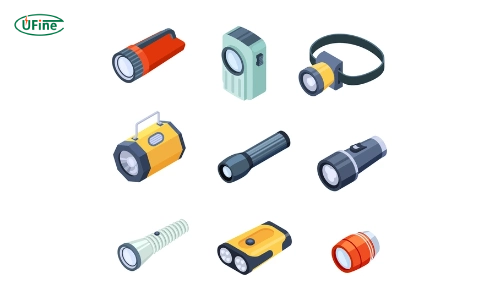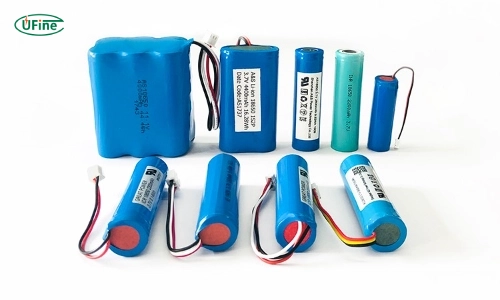
When choosing a suitable torch battery, the options can seem overwhelming. With numerous types and technologies available, it’s essential to understand how each works and best suits your needs. This comprehensive guide will walk you through everything you need about torch batteries, from the basics to specific recommendations.
Part 1. What is a torch battery?
A torch battery is a power source designed to provide energy to torches, also known as flashlights. These batteries come in various sizes, chemistries, and capacities, each suited to different applications. The primary function of a torch battery is to convert stored chemical energy into electrical energy, which powers the light-emitting diode (LED) or incandescent bulb in a torch.
Key Features of Torch Batteries:
- Voltage: The electrical potential difference, typically measured in volts (V).
- Capacity: The amount of charge a battery can store, measured in milliampere-hours (mAh) or ampere-hours (Ah).
- Size: Physical dimensions to fit the torch’s battery compartment.
- Chemistry: The chemical composition, such as alkaline, lithium, nickel-metal hydride (NiMH), or lithium-ion (Li-ion).
- Rechargeability: Whether the battery can be recharged and reused.
Part 2. Comparing torch battery technologies
Alkaline vs. Lithium Torch Batteries
Alkaline Batteries are the most common type found in household torches. They are affordable, widely available, and offer a decent lifespan for low to moderate usage. However, they lose power quickly under heavy use and can leak if left in devices for too long.
Lithium Batteries, on the other hand, provide a higher energy density and longer shelf life. They perform better in extreme temperatures and are less likely to leak, making them ideal for high-drain devices and outdoor activities. While more expensive up front, their performance and reliability can justify the cost over time.
NiMH vs. Li-ion Rechargeable Batteries
Nickel-Metal Hydride (NiMH) Batteries are a popular choice for rechargeable torches. They have a good balance of capacity and cost and are better for the environment than disposable options. You can recharge NiMH batteries hundreds of times, making them a cost-effective choice in the long run. However, they suffer from self-discharge, meaning they can lose charge even when unused.
Lithium-ion (Li-ion) Batteries are the gold standard for rechargeable torch batteries. They offer the highest energy density, longer cycle life, and minimal self-discharge. Li-ion batteries are lightweight and provide consistent power output until nearly depleted. They are more expensive but are worth the investment for heavy users and professional applications.
Specialty Batteries for Tactical Torches
Tactical torches often require specialty batteries that can handle high-drain applications and provide maximum reliability. CR123A and 18650 batteries are standard in tactical flashlights. CR123A batteries offer high power output and long shelf life. In contrast, 18650 batteries are rechargeable and balance capacity and performance.
Part 3. Choosing the best torch battery for your needs
Selecting the suitable torch battery depends on several factors, including usage patterns, environmental conditions, and budget. Here are some considerations to help you make the best choice:
- Usage Frequency: Alkaline batteries suffice for occasional use. For frequent use, consider rechargeable options like NiMH or Li-ion.
- Environmental Conditions: Lithium batteries perform better in extreme temperatures, making them ideal for outdoor activities.
- Budget: Rechargeable batteries have a higher upfront cost but can save money in the long run compared to disposables.
- Device Compatibility: Ensure the battery type is compatible with your torch. Always check the manufacturer’s recommendations.
Part 4. Top recommendations for torch batteries
1. Best Batteries for Everyday Use Torches
For everyday use, Duracell Alkaline Batteries are reliable and widely available. They offer good performance for standard flashlights and are cost-effective for low to moderate usage.
2. High-Performance Batteries for Tactical and Professional Use
For high-performance needs, we highly recommend SureFire CR123A Lithium Batteries. They provide a robust and consistent output for tactical and professional use. For rechargeable options, consider Panasonic NCR18650B Li-ion Batteries for their high capacity and reliability. Additionally,Ufine Battery offers 18650 torch batteries with OEM and ODM services, no minimum order quantity, and a one-year warranty.
3. Eco-Friendly Battery Options for Sustainable Lighting
If sustainability is a priority, Eneloop Pro NiMH Batteries by Panasonic is an excellent choice. They are pre-charged using solar power and can be recharged up to 500 times, reducing waste and environmental impact.
Part 5. Rechargeable vs. disposable torch batteries
When choosing between rechargeable and disposable torch batteries, weighing the pros and cons of each option to determine which best suits your needs is essential.
Rechargeable Batteries
Pros:
- Cost-Effective Over Time: Although the initial investment is higher, users save money in the long run by recharging batteries hundreds of times.
- Environmentally Friendly: Rechargeable batteries are a more sustainable choice by reducing the number of batteries in landfills.
- High Performance: Rechargeable batteries, especially Li-ion types, often provide higher capacities and consistent output than disposables.
- Convenience: Modern rechargeable batteries like 18650 Li-ion come with USB charging options, making them easy to recharge.
Cons:
- Higher Upfront Cost: Rechargeable batteries and chargers can be more expensive initially.
- Maintenance: They require regular recharging and proper care to ensure longevity.
- Shelf Life: Rechargeable batteries can lose their charge over time if not used, though this is less of an issue with newer technologies like Li-ion.
Disposable Batteries
Pros:
- Convenience: Ready to use straight out of the package, without charging equipment.
- Availability: Widely available in stores and online, making them easy to replace.
- Long Shelf Life: These can be stored for years without significant loss of charge, making them ideal for emergency kits and infrequent use.
Cons:
- Higher Long-Term Cost: Repeatedly buying disposable batteries can become expensive over time.
- Environmental Impact: Single-use batteries contribute to landfill waste and environmental pollution.
- Performance: Generally, disposable batteries, like alkaline, have lower capacities and may perform less well under heavy loads than rechargeables.
Part 6. Where to buy torch batteries?
When purchasing torch batteries, choosing a reliable source is essential to ensure you get high-quality products. Here are some recommendations on where to buy torch batteries:
1. Online Retailers
Amazon and eBay offer various torch batteries from multiple brands, including rechargeable and disposable options. These platforms provide customer reviews and ratings, helping you make informed decisions.
2. Specialty Stores
Stores specializing in electronics and outdoor gear, such as Best Buy and REI, often carry a selection of high-quality torch batteries, including those designed for tactical and professional use.
3. Direct from Manufacturers
Buying directly from manufacturers can be an excellent option for those looking for specific battery types. Ufine Battery, for example, offers 18650 torch batteries with the added benefits of OEM and ODM battery services, no minimum order quantity, and a one-year warranty. You can visit their website to explore their offerings and make a purchase.
4. Local Stores
For immediate needs, local hardware stores, supermarkets, and electronics shops typically stock a variety of torch batteries. While the selection may be more limited than online options, local stores are convenient for quick replacements.
Related Tags:
More Articles

고방전 배터리는 높은 전류와 발열로 배터리수명이 줄어듭니다. 구조적 한계, 사용 패턴, 충전 습관 등 실제 수명 단축 요인을 체계적으로 분석했습니다.
Capacitor vs Battery: What is the Difference?
Capacitor vs battery explained in detail. Learn the difference between capacitor and battery in energy storage, charging speed, lifespan, and real applications.
18650 Battery vs AA: Which Is Better for Your Device?
Compare 18650 vs AA batteries in capacity, voltage, rechargeability, and applications. Learn which battery type fits high-drain or everyday devices.
What is the Difference Between Battery Cell, Battery Control Module, and Battery Pack?
Compare battery cells, modules, and packs. Learn functions, design differences, control modules, and selection tips for EV, ESS, and industrial use.
How to Prevent LiPo Battery Explosion?
Can LiPo batteries explode or catch fire? Learn key causes of LiPo battery fires and proven charging, storage, and handling tips to reduce explosion risk.




